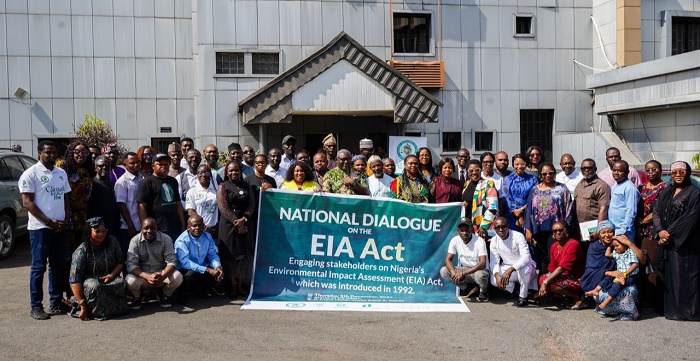Cross-cutting experts in the environmental community have called for urgent changes in Nigeria’s Environmental Impact Assessment (EIA) Act to tackle its inadequacies.

Giving the charge at a one-day stakeholders’ national dialogue on the EIA Act hosted by the Global Initiative for Food Security and Ecosystem Preservation (GIFSEP) in partnership with OXFAM in Nigeria and the Centre for Journalism Innovation and Development (CJID) on Thursday, December 5, 2024, in Abuja, the group emphasises that the proposed amendments should reflect current ecological and socioeconomic realities.
The talk, themed “Engaging Stakeholders on Nigeria’s Environmental Impact Assessment (EIA) Act,” brought together environmental specialists, policymakers, civil society organisations, and corporate sector representatives to brainstorm about the Act, which was last amended in 2004.
Significant flaws in the present legislation were noted by the participants, including its outdated provisions, weak enforcement mechanisms, and inadequate attention to new problems like biodiversity loss and climate change.
The absence of meaningful participation of local people in environmental decision-making processes was also spotted by the stakeholders as another important problem that the legislative framework must take into consideration.
In his keynote speech, GIFSEP Executive Director, Dr. David Michael Terungwa, underlined how important it is for Nigeria to bring its environmental regulations into line with international best practices.
According to the environmental rights advocate, the alignment is critical since the EIA Act, as it currently stands, has struggled to keep up with evolving problems, despite the fact that environmental sustainability is at the heart of sustainable growth.
This is why, he continued, the conversation marks a key step by his organisation in contributing to tackling the issue and ensuring that development projects in the country do not harm the environment, biodiversity, or future generations.
He drew the participants’ attention to the Act’s recent extensive media coverage, particularly in view of the ongoing construction of the Lagos-Calabar coastal highway, which he acknowledged is essential to accomplishing the country’s economic goals since it promotes trade, transportation, and general socioeconomic development.
“However, it is imperative that such development does not come at the expense of crucial social and environmental considerations that underpin sustainable development,” he stated.
In an exclusive interview with Professor Jude Nduka Omeje from the University of Abuja, at the sideline of the event, he said there is a need for a more effective EIA Act that will be holistic in adapting to emerging issues.
“When this Act was enacted, there were some issues that are challenging to us today that were not there before,” he observed, adding that when the act was promulgated, “emphasis was made on developmental issues, oil and gas, and mining, but today, there are direct impacts of activities that may not be developmental activities but projects.”
The academia hinted that several government projects, such as mass housing, have unintended consequences on the environment, such as deforestation. “When you build two houses, you replant trees there so that it will cushion the effects of climate change,” he advised.
Prof. Omeje’s submission underscored the importance of scaling up data collection as part of actions to reduce environmental risks.
The event’s discussions focused on crucial areas that require transformation in the Act. Stakeholders, including officials from the Federal Ministry of Environment, Abuja Geographic Information Service, Department of Climate Change, and others, stressed the need for stronger enforcement mechanisms to prevent ecologically hazardous projects from skipping due procedure.
They also argued for the inclusion of climate change mitigation and adaptation measures in the EIA framework to ensure its continued relevance in a rapidly changing world, as well as the inclusion of host communities’ perspectives and interests in the environmental assessment process.
To solve these problems, numerous recommendations were made. These include amending the Act to require frequent environmental audits, imposing stiffer fines for noncompliance, and strengthening regulatory agencies’ capabilities to increase oversight and enforcement. Public awareness programs were also proposed to educate stakeholders on the need of following EIA protocols.
At the end of the exercise, everyone agreed that modernising the EIA Act is essential to reaching Nigeria’s sustainability objectives. By fixing its present hitches, the nation can better safeguard its ecosystems, manage its natural resources, and slow down environmental deterioration.
By Etta Michael Bisong, Abuja
